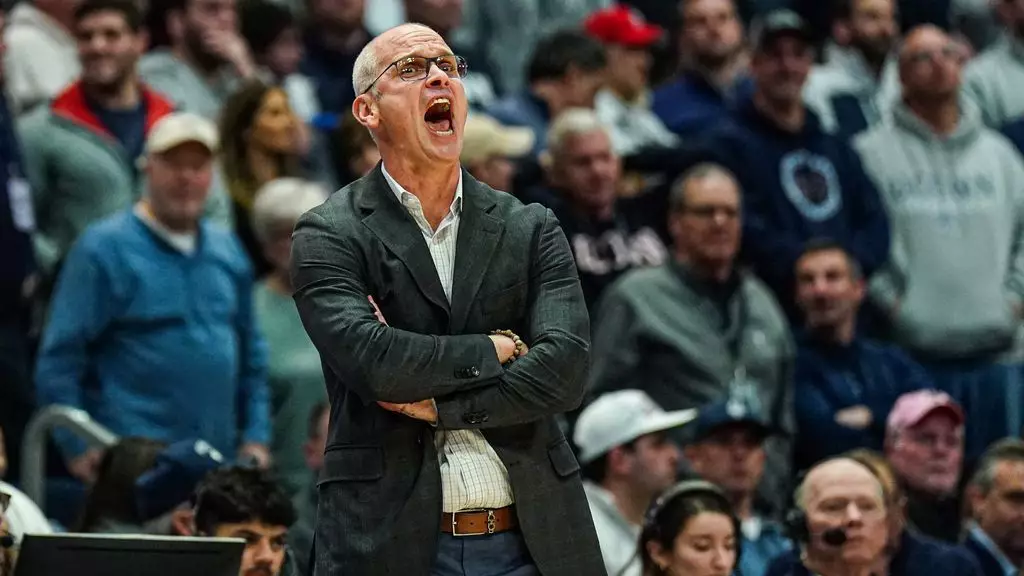In the electrifying realm of college basketball, few figures embody the raw emotion and volatility of the sport quite like UConn’s head coach Dan Hurley. Recent events following his team’s painful exit from the NCAA tournament against the Florida Gators have led to a firestorm of criticism—and introspection. After the game concluded with a heartbreaking 77-75 score, Hurley unleashed a tirade about the officiating, an outburst that he later regretted. As fans and analysts dissect this moment, one has to ask: When does passion become problematic?
Hurley’s comments, allegedly made in a “media-free” zone behind the scenes of the arena, reveal a coach grappling with the emotional investment tied to the success of his players and the pride of a storied program. Passion fuels competitiveness, yet crossing that line has consequences that all involved must reckon with. While Hurley acknowledges his misstep in criticizing the officials of a tightly contested game, what does this say about the state of coaching in college sports? The answer, as nuanced as it might be, suggests that while raw emotion has its place, it also threatens to blur the integrity of competition.
The Aftermath: Accountability Beyond the Coach
Surprisingly, the urgency of Hurley’s comments extended beyond the court, involving the UConn communications staff in an embarrassing incident with media personnel. Bobby Mullen, the director of men’s basketball communications, reportedly attempted to suppress the video of Hurley’s remarks, leading to a threatening exchange with a media member. While Mullen later apologized, this further illustrates the pressure that permeates college athletics. Rather than focusing solely on the game, the aftermath became a narrative about protecting reputations—a familiar dance in the high-stakes arena of college sports.
The ramifications of Hurley’s emotional outburst extend beyond personal regret, echoing the broader systemic issues in college athletics. As the scrutiny turns towards team management and behavior, it raises an uncomfortable question: Who’s truly accountable? Coaches like Hurley often operate under tremendous pressure, leading to moments of weakness. However, the organizational culture surrounding them—one that often prioritizes results over reflection—merely exacerbates these explosive situations.
A History of Hotheads: Cautionary Tales in Sports
As college basketball continues to captivate millions, it’s essential to scrutinize the trend of fiery outbursts within the sport. Let’s not forget the legendary Bobby Knight, a coach whose unrestrained emotions frequently landed him in the hot seat. Similarly, incidents involving other coaches have sparked debates not just about the sport, but about what it means to embody sportsmanship.
Hurley’s reputation as a fiery competitor isn’t new; earlier in the season, he sparked controversy with heated complaints about officiating during the Maui Classic and even engaged in taunts directed at opposing fans. Such behaviors, while undeniably charismatic for many fans, also risk romanticizing aggression over decorum. Sportsmanship isn’t merely an antiquated ideal; it serves as a cornerstone that can uplift the experience of competition for everyone involved.
Why This Matters: The Bigger Picture of Sportsmanship
Dan Hurley’s saga raises an important moral imperative in college athletics: the responsibility to represent not just a school, but an ethos of integrity and respect. Winning is undoubtedly the goal, but the manner in which one reaches that goal has ramifications extending far beyond a single game. College sports should serve as a microcosm for larger societal values, and coaches have a significant role in shaping the behaviors of not just their teams, but future generations.
In a climate where sports often blend with showmanship, it is crucial to remember that while emotion can drive a team to greatness, unchecked passion can ultimately corrode the very fabric of the competition. As UConn moves forward, it remains to be seen whether Hurley will leverage this experience for personal growth and, more importantly, whether that growth will translate into a more reflective culture within collegiate athletic programs. The incident serves as a potent reminder: emotional investment in sport, while vital, must be aligned with principles of respect and integrity. Therefore, in moments of heated passion, the stakes remain high—not just on the scoreboard, but in the legacy we leave behind.


Leave a Reply